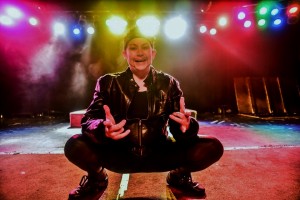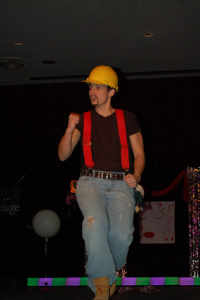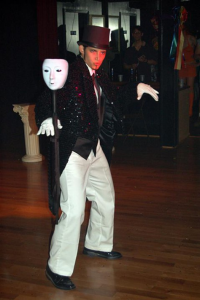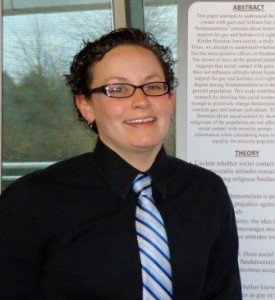 Southern drag kings are interrupting the gender binary and making the South a safer place for queer people. Yes, drag kings do exist in the South, even the rural South. In our recent study (coauthored with Kimberly Kelly), we examine 27 South Carolina drag kings’ ideas about and experiences with drag in the South. The goal of this project is to make queer life in the South more visible and to explore how it differs from larger metropolitan areas that are more often the subject of academic research. Drag culture in the South is thriving and we wanted to know more about its impact.
Southern drag kings are interrupting the gender binary and making the South a safer place for queer people. Yes, drag kings do exist in the South, even the rural South. In our recent study (coauthored with Kimberly Kelly), we examine 27 South Carolina drag kings’ ideas about and experiences with drag in the South. The goal of this project is to make queer life in the South more visible and to explore how it differs from larger metropolitan areas that are more often the subject of academic research. Drag culture in the South is thriving and we wanted to know more about its impact.
Our findings suggest that Southern drag kings do not share intentions with drag kings in larger cities. Southern drag kings do not wish to overtly challenge the gender status quo. Unlike drag kings in other areas, they do not think of their performance as political. In contrast, Southern drag kings understand drag as a safe and fun outlet for expressing a female masculinity not respected in their everyday lives. As one king explains, “From all the experiences I’ve had, it’s just about fun and escape.”
 The majority of drag kings in the South entered drag to express their long-term identification with masculinity. Many use drag as a testing ground for gender transition. Southern drag kings often described difficulty finding spaces where their masculine, or otherwise queer, identities were accepted. Performing drag was one place where many kings felt accepted and received positive messages about queer culture and transgender identities. Through drag they were able to receive information about gender identity and sexuality that many perceived unavailable outside these venues in the South. One drag king explains that drag is a place where transgender people can feel more comfortable. He says, “I guess more people are naturally drawn to that if they don’t feel comfortable in their skin because it’s like the first arena where you’re accepted as your new persona.”
The majority of drag kings in the South entered drag to express their long-term identification with masculinity. Many use drag as a testing ground for gender transition. Southern drag kings often described difficulty finding spaces where their masculine, or otherwise queer, identities were accepted. Performing drag was one place where many kings felt accepted and received positive messages about queer culture and transgender identities. Through drag they were able to receive information about gender identity and sexuality that many perceived unavailable outside these venues in the South. One drag king explains that drag is a place where transgender people can feel more comfortable. He says, “I guess more people are naturally drawn to that if they don’t feel comfortable in their skin because it’s like the first arena where you’re accepted as your new persona.”
Although their intentions are largely individualistic, for entertainment or gender transition, we argue the performance of drag in the South still has the effect of challenging the gender order and leads others to push for change in our society. Intentionality is not necessary for political impact.  By performing as men, drag kings question the innateness of masculinity and show its performative nature. That Southern drag kings do not overtly state these challenges to the gender order does not eliminate the power of their performances.
By performing as men, drag kings question the innateness of masculinity and show its performative nature. That Southern drag kings do not overtly state these challenges to the gender order does not eliminate the power of their performances.
Though the South may not be ready for an overt challenge to the gender hierarchy, drag provides a safe space for those who wish to step outside the gender binary. Southern drag kings understand the conservative nature of the South, and rather than challenge it directly, seek to remove themselves from it, if only for one show. Although change may be slower in the South than other areas of the country, drag provides a glimmer of hope for overcoming the gender hierarchy, especially in a context where the gender binary is so rarely interrupted.
________________________
 Ashley A. Baker recently completed her PhD in Sociology at Mississippi State University and begins a position as an Assistant Professor of Sociology and Social Work at Simpson College in the Fall of 2015. Her coauthor, Kimberly Kelly, is an Associate Professor of Sociology and the Director of Gender Studies at Mississippi State University.
Ashley A. Baker recently completed her PhD in Sociology at Mississippi State University and begins a position as an Assistant Professor of Sociology and Social Work at Simpson College in the Fall of 2015. Her coauthor, Kimberly Kelly, is an Associate Professor of Sociology and the Director of Gender Studies at Mississippi State University.
Their article “Live Like a King, Y’all: Gender Negotiation and the Performance of Masculinity among Southern Drag Kings” will be released for OnlineFirst publication at Sexualities soon.
